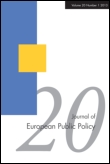By Jetschke, Anja, and Tobias Lenz

In the post-World War Two era, regional organizations have proliferated. The accompanying literature focuses on analysing the drivers and effects of regionalism, but has, to date, largely neglected a series of puzzling macro-phenomena: the marked spatial and temporal clustering of regional organizations, as well as similarities in their institutional design. This contribution argues that the existing approaches analyse regional organizations primarily as independent phenomena, whose genesis and design are seen as being determined either by dynamics internal to the region itself or by external forces such as powerful hegemons and globalizing pressures. Against this background, this research note argues for the broadening of existing analytical perspectives and sketches a diffusion-oriented research agenda that instead conceives of regional organizations as being interdependent.
Published:
2013